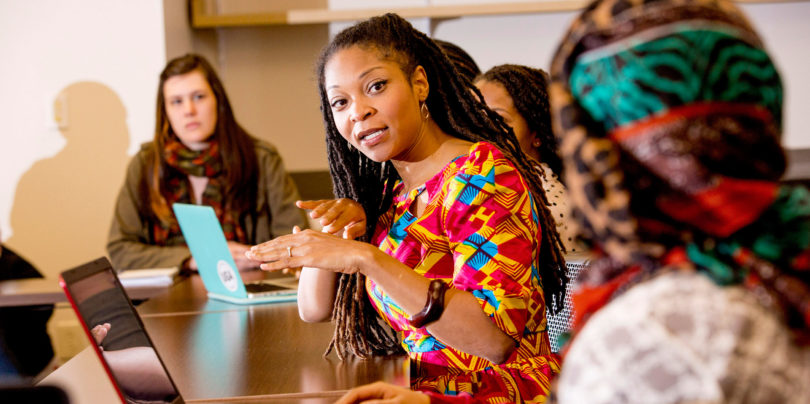Dr. Tamora Callands, an assistant professor in the College of Public Health, infuses her experience conducting research across the nation and abroad directly into her teaching to pique the interest of students.
Where did you earn degrees and what are your current responsibilities at UGA?
I earned my bachelor’s degree in psychology with a minor in sociology at the University of Connecticut. Then I obtained both my master’s and doctoral degree in clinical psychology at Purdue University. I also completed a three-year NIH T32 postdoctoral fellowship in clinical community psychology in the department of psychiatry at Yale School of Medicine. I am currently an assistant professor in the department of health promotion and behavior in the College of Public Health.
When did you come to UGA and what brought you here?
I came to UGA in August 2013 as a research scientist. In fact, I had just completed my postdoctoral fellowship and the opportunity presented itself to continue my research in Liberia with my mentor, who had just accepted a position here at UGA.
What are your favorite courses and why?
My favorite courses to instruct are independent studies. Teaching these courses involves a very different instructional style. For starters, I am able to get know students better because I work one-on-one with them in my specific research area—typically for more than a semester. In my opinion, there is nothing more rewarding in academia than to see students present research at conferences, write and submit manuscripts, and grow over time.
What interests you about your field?
I work in the area of global health with a specific focus on mental health, sexual and reproductive health and HIV prevention in post-conflict and/or low-resource settings. I have the unique opportunity to work in Liberia and Sierra Leone, and what is most fascinating is that despite differences in context and historical events between these countries and the U.S., the same underlying issues impact mental health, sexual and reproductive health and HIV prevention. Also, I have the opportunity to work directly with grassroots organizations and individuals on the ground to impact health outcomes.
What are some highlights of your career at UGA?
My first year at UGA, I was awarded an International Research Scientist Development Award funded by National Institutes of Health Fogarty International Center. I was also awarded a pilot grant from University of Georgia Research Foundation’s Faculty Research Grants Program.
How does your research or scholarship inspire your teaching, and vice versa?
Throughout my tenure in academia, I have had several experiences in both international and domestic settings that inspire my teaching and research. I work diligently and purposefully to infuse my research experiences directly into my teaching, which piques the interest of students and draws them to my work. The work I do is quite emotionally taxing, and I want students to understand that it takes patience, compassion, drive and a unique skill set that is not taught through textbooks but rather through “getting your hands dirty in the field.”
What do you hope students gain from their classroom experience with you?
What I hope to underscore is the importance of flexibility and experiential learning. Often, what is taught in a classroom is the skeleton,and it is the student’s job to extrapolate outside of the books, the notes, the articles, and in some cases, the teachings of the professor to fill in body. Additionally, I hope they understand that life is a classroom and learning does not stop once you leave the physical space.
Describe your ideal student.
My ideal student is tenacious, inquisitive and willing to do what challenges them. Since I have been here, I have been pleasantly pleased with my students, particularly my undergraduates—they are so driven.
Favorite place to be/thing to do on campus is…
Engaging in fruitful conversation with students.
Beyond the UGA campus, I like to…
Work out, travel and spend time with loved ones.
Community/civic involvement includes….
I serve on a few task forces for health strategies in international settings. I have also served on hiring and diversity committees at the department level.
Favorite book/movie (and why)?
Dr. Suess’ “Oh, the Places You’ll Go.” It was given to me a graduation gift, and it holds a special place in my heart because it reminds me that I should aim high and never become complacent. I often give this book to students as a graduation gift along with an individualized special note.
Proudest moment at UGA?
My proudest moments have all come from students. In particular, I was chatting with a student about their future goals and I shared a few personal career challenges with this student. Out of nowhere, this student told me how grateful she is to work with me and how much she has learned about research and academia.
Posted on February 7, 2016.
Originally published February 7, 2016 for UGA’s Focus On Faculty feature: https://news.uga.edu/callands-tamora/.







